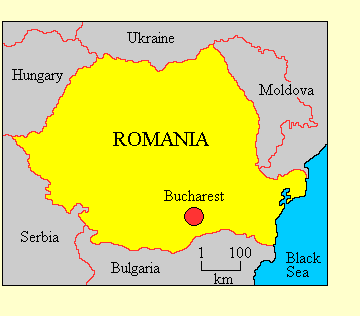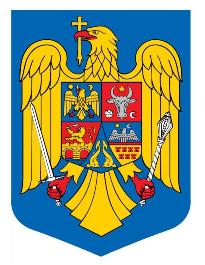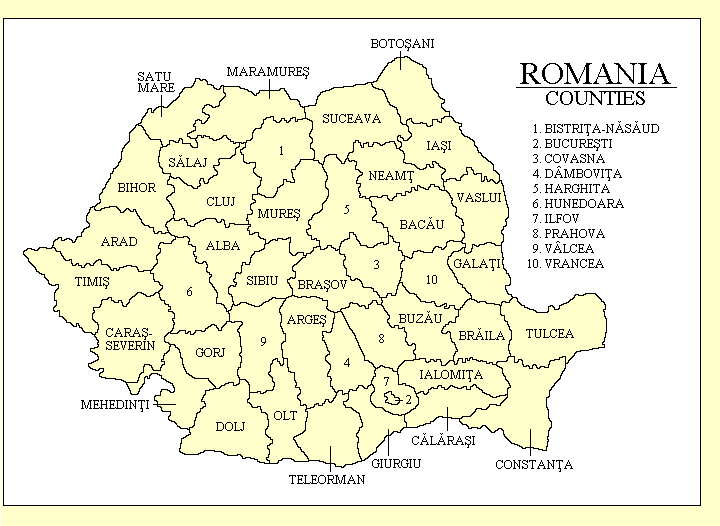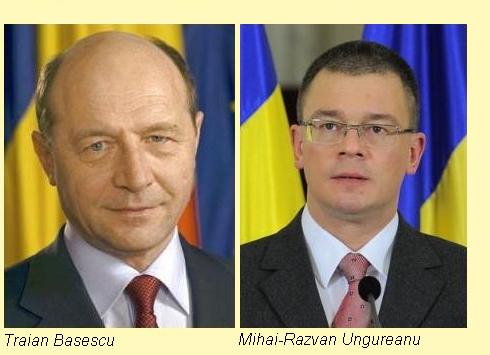

ROMANIA
• Official name: Romania
• Location: Eastern Europe
• International organisations: Council of Europe, European Union, North Atlantic Treaty Organisation, Organisation for Economic
Co-operation and Development, Organisation for Security and Co-operation in Europe, United Nations, World Trade Organisation
• Borders: Bulgaria, Hungary, Moldova, Serbia, Ukraine
• Coastline: Black Sea
• Land area: 237,500 Km2
• Population: 21,500,000
• Annual GDP (PPP) per capita: US$11,500 (2009 CIA estimate). World ranking: 75
• Ethnicity: Romanian 89.5%, Hungarian 7.1%, Roma 1.8%, German 0.5%
• Languages: Romanian is the official language and is spoken by 90% of the population. Hungarian is spoken by 7% of the population.
• Religion: About 70% of Romanians are at least nominally Romanian Orthodox Christians. The Hungarian minority are mostly Catholics.
There are small Protestant and Jewish minorities.
• Form of government: Presidential democratic republic. Romania is divided into 41 counties and the Bucharest Municipality.

• Capital: Bucuresti (Bucharest)
• Constitution: The Constitution of Romania came into effect on 8 December 1991.
• Head of state: The President, elected by direct universal suffrage for a four-year term.
• Head of government: The Prime Minister, appointed by the President. The Prime Minister is usually the leader of the largest party in the
lower house of the legislature.
• Legislature: The Romanian Parliament (Parlamentul Romaniei) is a bicameral legislature. The
Chamber of Deputies (Camera Deputatilor) has 332 members
elected for four-year terms, of whom 314 are elected by proportional representation and 18 members
are elected to represent ethnic minorities.
The Senate (Senatul) has 137 members, elected for four-year terms
by proportional representation. (The number of members of both
houses changes according to changes in population.)
• Electoral authority: The Romanian Central Election Bureau
administers national elections.
• Freedom House 2011 rating: Political Rights 2, Civil Liberties 2
• Transparency International Corruption Index: 37% (69 of 178 countries rated)
• Reporters Without Borders Press Freedom 2010 Index: 84% (52 of 178 countries rated)
• Heritage Foundation Economic Freedom 2010 Index: 64.7% (63 of 178 countries rated)
Political history
The three historic Vlach or Romanian principalities of Wallacia, Moldavia and Transylvania were brought under Ottoman rule in the 15th
century, although they retained some degree of autonomy. An independence movement developed in the 19th century and in 1866 Romania became an
independent principality under an imported Hohenzollern prince. In 1881 the country became fully independent as the Kingdom of Romania,
although Transylvania remained under Hungarian rule until 1918.
After the First World War Romania established a parliamentary system, and the liberal leader Ion Bratianu attempted to carry out
land reform and other steps towards a stable democracy. But his efforts were thwarted by ethnic and political conflict, and in 1938 a royal
dictatorship was established by King Carol II. From 1940 a fascist regime under Marshall Ion Antonescu held power, and Romania entered the
Second World War as a German ally. This led in 1944 to Soviet occupation, the overthrow of the monarchy and the establishment of a Communist
regime in 1947.

Under the Communist ruler Gheorghe Gheorghiu-Dej from 1947 to 1965, Romania was an orthodox member of the Soviet bloc. His successor
Nicolae Ceausescu, however, established a bizarre personal dictatorship which isolated the country and ruined its economy, although
Ceausescu was for a time favoured by the west because of his independence from Soviet domination. In December 1989 Ceausescu was overthrown
and executed when a popular revolt triggered an army coup. Romania had a difficult transition to democratic government and a free market economy,
with frequent strikes, riots and changes of
government. The situation has become more stable since 2000, and Romania has joined both NATO and the EU.
Romania has now developed a fairly stable party system. The two main parties of the right are the
Democratic Liberal Party (PLD) and the more liberal National Liberal Party
(PNL). The main party of the centre-left is the Social Democratic Party (PSD), which is in a rather strange
alliance with the Conservative Party (PCR). The Hungarian
Democratic Alliance of Romania (UDMR) represents the Hungarian minority in Transylvania.
In 2004 Traian Basescu of the PNL was elected President at the head of a
centre-right coalition, defeating the PSD candidate Adrian Nastase. The 2008 legislative elections saw the PSD-PC alliance and the
PLD emerge as the two leading parties, with almost the same number of seats - the PNL came a distant third.
The PLD's Emil Boc then became Prime Minister. At the 2009 presidential elections Basescu narrowly defeated the PSD's
Mircea Geoana. In February 2012 Boc resigned and was succeeded by a non-party technocrat,
Mihai-Razvan Ungureanu.
Freedom House's 2011 report on
Romania
says: "Romaniais an electoral democracy. Elections since 1991 have been considered generally free and fair...
Romania has struggled to meet EU anticorruption requirements since joining the bloc in 2007. The latest EU
progress report in July 2010 criticized the country for a lack of political will to reform, and particularly
faulted the effective suspension of the new National Integrity Agency (ANI), which vetted and released public
officials' asset declarations... The constitution protects freedom of the press, and the media are characterised
by considerable pluralism. However, a weakening newspaper market led some foreign media companies to withdraw from
the country in 2010. Political bias at state-owned media is a concern, and private outlets are heavily influenced
by the political and economic interests of their owners... The constitution guarantees freedoms of assembly and
association, and the government respects these rights in practice... The judiciary is one of the most problematic
institutions in Romania. The 2010 EU progress report hailed the enactment of new criminal and civil procedural
codes in June, but noted that they were not expected to take effect until late 2011... The EU report criticised the
judicial disciplinary system, citing lenient sanctions and the paucity of cases opened."
Updated March 2012
|


